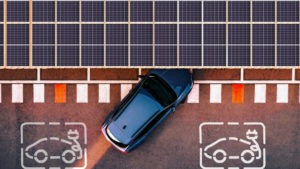Global e-waste is an $80bn problem, and these Australian companies are trying to solve it

Global electronic waste in 2019 exceeded 50m metric tonnes. (Pic: Getty)
Accompanying the rise of mobile electronic devices has been an equally rapid increase in global e-waste.
And amid a post-COVID surge in demand for consumer electronics, e-waste has become another sector Australian companies are getting involved in with a scalable solution.
Data from the World Health Organisation (WHO) shows global e-waste — defined as discarded products with a battery or plug — reached 53.6 million tonnes in 2019, and is expected to climb by another 40 per cent over the next decade.
The WHO added that only 17.4 per cent of that 53.6 million tonnes was recycled last year. And it estimated that various component parts (mainly rare earths and precious metals) with an equivalent value of over $US57bn (~$80bn) were thrown away, rather than re-used.
Circular economy
In view of those big numbers, Stockhead spoke with two Australian companies looking to commercialise solutions to facilitate the growth of a “circular economy”.
One local player is E3Sixty, which has developed e-waste disposal technology that can extract the precious metals from discarded electronic products.
Director Anthony Karam said the company’s aim was to establish a “minerals recovery hub” in the Australian market, and build a first-mover advantage with “what we consider to be an authentic example of a circular economy”.
The company’s proprietary solution also facilitates the secure destruction of data, and a mining process that can effectively harness and store clean energy.
Adjacent to that in the listed space is tracing technology company Security Matters (ASX:SMX), which is looking to capitalise on the shift to e-waste solutions that are now being prioritised by electronics manufacturers.
“Suddenly those issues are in play around how to be environmentally sustainable within electronics manufacturing,” CEO Haggai Alon told Stockhead.
“That’s where our solution comes in because we can mark all materials from solids to liquids and plastics to smart metals. I think the world of electronics is moving on from dealing with sustainable issues only related to batteries, to looking to the device as a whole.
“In that sense, the most important thing is to start designing and manufacturing full devices and enable them to be produced in a way that enables full circularity and reuse.”
COVID-19 impact
Both Karam and Alon noted a shift in the response to the problem of e-waste disposal, following a surge in electronics sales and the acceleration of online channels in the wake of the pandemic.
“At a macro level there are two interesting developments worth noting,” Karam said.
“Firstly, we’ve seen a marked shift in terms of the prioritisation of major telecommunication infrastructure works and programs. We’ve been involved in those discussions, and as such we’ve seen the escalation in that sector.
“And secondly, the government policies around environmentally-friendly processing of e-waste and the banning of exports of that material all support the urgent need for an in-country solution.”
Security Matters’ Alon said COVID-19 had created a talking point around sustainability and electronics production, where previously the two “weren’t treated in the same discussion”.
“The fact is, electronic device manufacturing will now have to shift to deal with the challenge of how to build sustainable products at the same level of quality, with technical and mechanical properties where they are right now,” he said.
“So the question becomes how to create full circularity with materials that can be used again and again.”
Looking ahead
Having built out its process-tested technology, Karam said E3Sixty was now focused on a commercial rollout of its e-waste solution — the speed of which will be influenced by access to capital and regulatory approvals.
He said the company’s current focus was squarely on closing out practical matters such as planning and permitting.
“An integral part of that process and our path to execution requires us to liaise and work closely with various industry bodies and government agencies at local, state and federal levels,” he said.
In a similar way, Alon said Security Matters was working with partners and stakeholders to play a key role in what it expected would be a broader shift at an industry level.
“Our own technology is purpose-built to mark different kinds of material during the production process. And we’re the only company that can mark it in such a way that it can be sustained for the whole life cycle, including into recycling and e-waste,” he said.
“So we’ve already had discussions with potential clients and global alliances to try to tackle this with an industry-level approach, and create a new industry based on this shift.”
And looking at it from an industry level, Karam said the market opportunity was “significant and real”.
The company’s ability to build market share “will come from working with those participants in the e-waste industry, from product stewardship through to and including down-stream recyclers”.
“We’ve taken positions in both those spaces here in Australia and we’re well into discussions for similar arrangements in other key jurisdictions globally,” Karam said.
UNLOCK INSIGHTS
Discover the untold stories of emerging ASX stocks.
Daily news and expert analysis, it's free to subscribe.
By proceeding, you confirm you understand that we handle personal information in accordance with our Privacy Policy.








